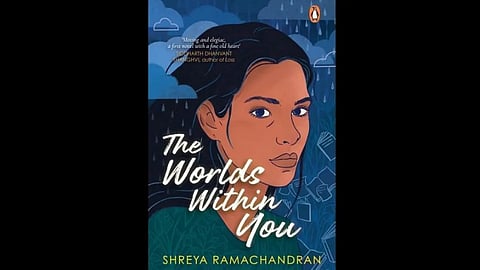Returning, I say to myself in my head. I think of seagulls. Or is it cranes? Suddenly, I can hear every single second of the ticking clock. I hear a game someone in the waiting room is playing, little flourishes after collecting digital diamonds. I hear a motorcycle horn. Kishore Kumar still sings.
Book Excerpt: Interpreter Of Maladies
Nirmal explains depression and anxiety both — the lows and the jitters — but I don’t remember what she says exactly. I just nod at the words that filter through to me: irritable and intelligence and energy and perception.
‘I did the tests and everything . . . I guess I just want to know . . . if something is wrong. Do I have a disorder?’
Will me wanting something to be wrong with me somehow bias Nirmal? Will she think something is even more wrong with me? What am I even thinking?
Nirmal smiles.
‘Tell me your symptoms. Whatever is striking you if you think.’
‘I’m just tired, I can’t focus, I worry a lot, my thought patterns are a bit . . . And I feel tired.’
‘Every day? Most days?’
‘For some time every day.’
‘Are you sleeping as you regularly do? More? Less?’
Like adding salt to kovakkai curry. Little more?
‘The usual, I think. I sleep around eleven . . .’ I think back to that moment before sleep, which sometimes passes fast and sometimes stays like a rain cloud. ‘I wake up at seven.’ Because Amma is talking, clattering, opening doors around then. Sunlight slowly fills the house, waking up slowly, after Amma. In college, I used to wake up only when the garbage trucks wheeled the ten-foot-high bins down the back lanes outside my window, a loud rumbling, the views broken into grids by scaffolding.

‘Right,’ Nirmal says. She taps at the file. ‘It is quite clear here. You have mild strains of clinical depression and very much of anxiety.’
Thank God.
Or . . . maybe not?
I don’t know.
I focus on the small details: the blue vein on her right hand, the cream stripe on her blue polo-neck shirt, the Tupperware box under her desk, filled with sweet lime rinds.
‘All right.’
‘Would you like to discuss this?’
No.
‘Sure.’
Nirmal explains depression and anxiety both — the lows and the jitters — but I don’t remember what she says exactly. I just nod at the words that filter through to me: irritable and intelligence and energy and perception.
‘But most importantly, dear, you can easily manage them and live a healthy and productive life. I can definitely help you. Are you overwhelmed?’ She taps her pen against her prescription pad; it lands softly. ‘Usually, people sit here for hours. One patient sat for so long, asking so many questions . . .’ She looks more closely at me.
‘No, I went to my college counsellor, and you know, they had these little books . . . How to identify . . . and then all kinds of illnesses. You know? So maybe . . .’ I look down at my palms.
‘I spent some time there, you know,’ Nirmal says. ‘In the UK. Mostly in Cambridge. It was so easy to drive there. Here, just one main road makes me deaf . . . Tell me how you feel, dear. Take your time.’
I look up at her and she is just looking right at me.
‘I know other people suffer . . . But I just didn’t think I was sad enough . . . if that’s what I’m supposed to think? Or anxious enough.’
We both, or maybe I just imagine this, look to the side: the closed door, the version of myself that no longer exists.
I look at the lizard under the tube light on the wall.
‘Is that like a specific subspecies?’ I ask. ‘Of lizard. The domesticated tube light lizard.’
Nirmal gracefully accepts my need to change the topic. She turns around and looks at the lizard. The light falls slant on her hair.
She isn’t talking, which makes me nervous. I feel I need to say something to indicate my emotional thought process. Something revealing about who I am as a person. I think of Amma, appearing from the kitchen doorway, giving Nirmal tea in a ceramic mug. What did the mug say? I can picture it if I really think . . . It’s still there now, hung up above the sink in a line with all the other mugs, their faces tilted towards the sun . . . Did it say ‘Don't talk to me before coffee' in a cheery bubble font?
‘My mother says I do this a lot,’ I say. ‘What?’
‘Ask unanswerable questions.’
‘Aha?’ She is waiting for more.
Or maybe the mug had little volume levels: mood after one coffee. Two. Three.
‘Your mother is a lovely lady,’ Nirmal says, laying her hand flat on the desk. ‘So strong. I was speaking to her after a long time when she called to tell me about you. What do you ask her, do you remember any questions?’
‘I don’t know. I’ll let you know if I remember.’
‘Please do,’ Nirmal says. ‘Please do, dear. You should keep a note. Sometimes we forget things . . .’ She waves her hand around her temples, like she’s catching air.
‘If we do not keep a note. And now that you are my patient, I would like to know. Will you tell me?’ She looks down at her notes. ‘How do you feel about medication?’
‘Sure,’ I say. Then I realize that didn’t really answer her question directly. I feel great about medication but don’t want to seem insane. She starts writing, a scribble, every wave a crest, a cliché of a doctor’s penmanship.
‘Very small dosage for you, to start with. Let us see how you find it. If it is useful, you will see a visible improvement.’
She passes me the prescription pad.
‘You can buy these medicines from the receptionist right outside the office. And you make another appointment, you come back in one week.’
‘Sure.’
‘If anything is required, call. I find it difficult to respond to messages,’ Nirmal says.
‘Can I do everything with this medicine? I mean . . .’
‘You can be active,’ Nirmal says. ‘In fact, you must. At least two hours walking. And you can eat everything.’
I think of the rule about not eating before swimming. I wonder why I’m thinking that.
‘Bye, Doctor, thank you so much.’
‘Any time, dear.’
I slip out of the door and I look at my phone. Only twenty minutes. I wonder why I’m paying for the hour. And by ‘I’, I mean ‘Amma.’
I pay and pick up my medicines.
Look how seamless these transactions are. How very in control of my life I am.
I feel detached: like I’m administering help to somebody who isn’t me. Usually, I’m fine with this. But I wonder what it would be like to actually just feel something for once. My heart aches and a drowsy numbness pains my sense . . .
When I get home, I see Appa sitting on the landing outside the house, in just his white banian and linen shorts. In front of him are spread boot polish, sponges stolen from hotels and five formal pairs of shoes — wingtips, tasselled loafers, brogues, Oxfords.

‘Um,’ I say. ‘What are you doing?’
‘Polishing my shoes. How was the doctor? Sam. Sam!’ Sam runs out, still in her school uniform. ‘What, Pa?’
‘Get me a rag.’
‘It was fine. I mean, we only spent like ten minutes together. Oh also, she played a Kishore Kumar song.’
Amma wanders outside, still in her black kurta and big silver necklace, and sits down on the steps. ‘Which song?’ she asks.
‘Lena hoga janam hume . . .’ I half-sing.
‘Kai kai baar,’ Amma says. ‘Shekar, remember? Oh God.
What polish is this?’
‘All polish smells the same, Hema,’ Appa says. ‘Ami, you know what we all loved on campus? Hema, what was that song?’
‘What song?’ Amma asks.
Sam slips her hand into mine. ‘What was the diagnosis?’ ‘Anxiety and depression. But only mild. Gave me medicine.’ I stare down at my sandals. I need to re-polish my toenails. Sam lays her head on my shoulder.
‘Appadi. How suddenly?’ Appa asks.
‘What do you mean, “how”, Shekar. It’s not cholera,’ Amma stares down at him.
‘So what medication is it? Tell me, I’ll look it up,’ Appa says.
‘No, Pa,’ Sam objects. ‘Please, I don’t want you telling her any creepy side effects.’
‘If it’s liver damage, organ failure, something, we shouldn’t know?’ Appa asks.
‘It’s like the tiniest dose ever, Pa, nobody is getting liver damage,’ I say. ‘Nirmal knows what she’s doing.’
‘Nothing. Doesn’t know what she’s doing. Came and nicely told Thatha he had depression. He didn’t have depression. He had a sodium-level problem because of those jokers at the hospital. Get me a rag, someone.’
‘Of course, of course. Psychiatrists are wrong, doctors are wrong, but only you are right,’ Amma says. She hands Appa a rag torn from an old undershirt.
(Excerpted from ‘The Worlds Within You’ by Shreya Ramachandran, with permission from Penguin Random House India. Shreya Ramachandran grew up in Chennai and studied South Asian literature and history. She writes about mental health on her blog)